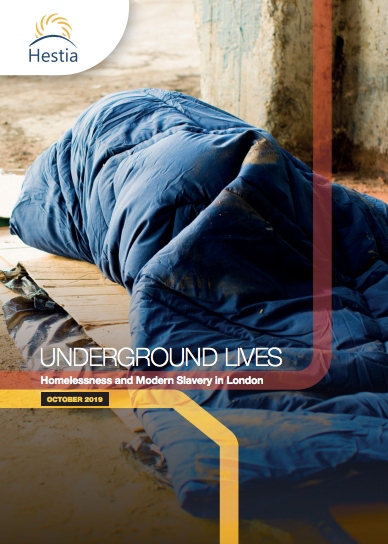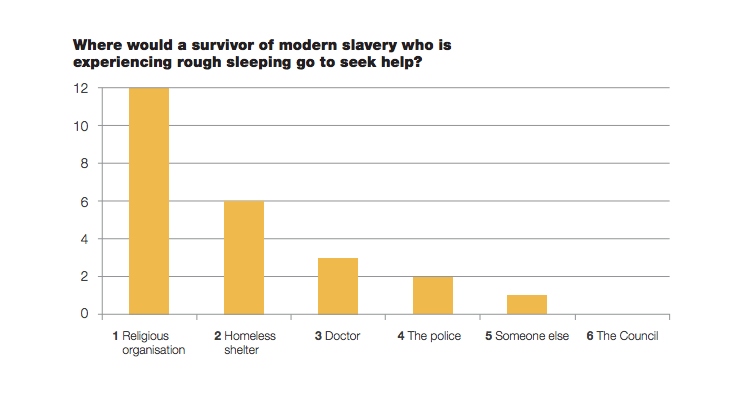'Churches in unique position to help exploited people'
A recent report showed that victims / survivors of Modern Slavery would turn to the church for help, which emphasises the importance of spotting the signs and knowing how to respond, writes Dan Pratt
 From foodbanks, to community cafés and night shelters, many of our churches seek to serve the homeless community particularly as the cold weather approaches.
From foodbanks, to community cafés and night shelters, many of our churches seek to serve the homeless community particularly as the cold weather approaches.
We know that people who are vulnerable, including homeless people, are targeted for exploitation through Modern Slavery by gangs. In my own locality in Southend, we have had people hanging outside winter night shelters and soup kitchens trying to recruit rough sleepers. Vulnerable people who are offered work, accommodation, food and alcohol often accept these offers. Unfortunately, many of these offers are exploitative, sometimes with victims being held captive for years.
Hestia is an organisation that has helped more than 3000 adult victims of modern slavery. Its recent report states that 54 per cent of male survivors of modern slavery supported by Hestia had been homeless. Hestia share Michael’s story:
Michael grew up in poverty in a single parent household. When he was 20 years old, a friend of the family promised to take him to London for a better life.
In London, Michael soon found out that he had been sold into slavery. He was moved from house to house by two men and forced to sleep with older women. He was given drugs and alcohol and he was beaten whenever he refused to comply.
Michael was sexually abused for six years before he saw an opportunity to escape. One of the women he was forced to sleep with promised to help him if he agreed to live with her. On the way to her house, Michael told her he needed the toilet and managed to escape at a service station. He flagged down a car and made his way to London.
In London, Michael had to sleep on the streets. He had no money and was desperate to contact his mother. Another homeless man told him he could find work in Peckham. That job consisted of cleaning a shop in exchange for sleeping on the floor. Michael met his future wife while she was also sleeping rough. Together, they slept on the shop floor and took on more cleaning jobs until they could afford to rent a room in Hackney. Michael was referred to Hestia when a pastor recognised his experience as slavery and helped him contact The Salvation Army.
As our churches continue to serve those who are street homeless and those are vulnerably housed, we are in a unique position to help exploited people. It was a pastor who recognised Michael’s experience of slavery and helped to safeguard him.
Hestia interviewed 12 survivors of modern slavery, asking them ‘where would a survivor of modern slavery who is experiencing rough sleeping go to seek help?’ All interviewees told us that a victim of modern slavery who was homeless would approach a church / mosque / or other religious organisation for help, if they knew where to find them.

Survivors of Modern Slavery state:
‘I approached the church for help and they helped me. I thank God for guiding me to that church as they called The Salvation Army and they helped me’
‘I believe church is easier - that was my experience – I was going to church to get connected to God. But it was not easy, as you don’t trust anybody; it was hard for me to express the challenges I was facing. It was the second church I went to, who had a pastor appointed for the homeless.’
The church and other places of worship are viewed as a place of safety and refuge for the vulnerable. This week alone, two local churches within my town identified two different cases of Modern Slavery relating to homeless people. These people were being exploited through domestic servitude, and forced criminality respectively. The churches, through engaging with these victims, were able to take action in partnership with other agencies in safeguarding them from their exploiters.
Every shelter, drop-in and outreach service has considerable opportunity to be able to spot the signs of modern slavery and to safeguard victims/ survivors. There is also a responsibility for us to slavery-proof our projects, to protect homeless people from traffickers. If you would like further information on how to slavery-proof your church/project and how to safeguard see the resources from The Clewer Initiative.
What should you do if you come across a homeless person who has been exploited?
-
If you are volunteering in a shelter or project, tell whoever is in charge of the project
-
If the person is in immediate danger, call the Police on 999, or for non emergencies, 101.
-
To report suspicions or to ask advice call the Modern Slavery Helpline 08000 121 700
-
Explore how to slavery-proof your project through the link: theclewerinitiative.org/letstalk
Dan Pratt is the Antislavery Co-ordinator for Together Free www.togetherfree.org.uk
The Hestia report from which the references are taken can be found here.
Baptist Times, 05/11/2019